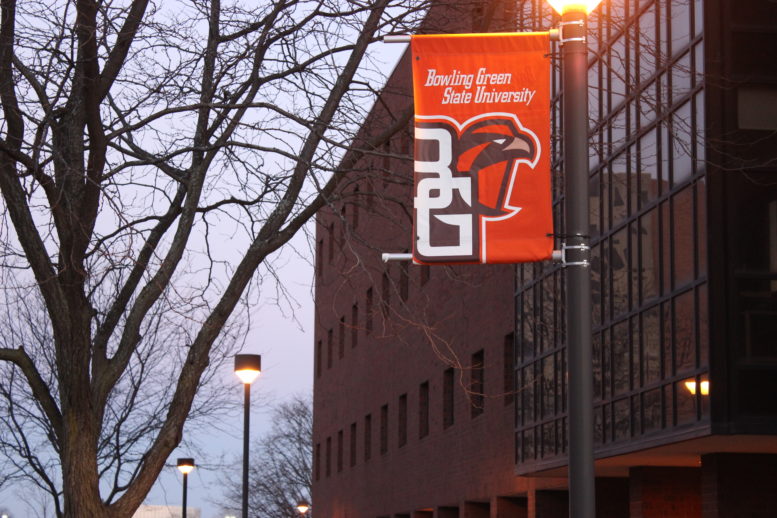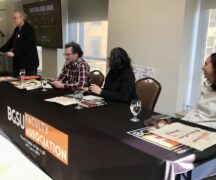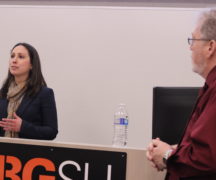By DAVID DUPONT
BG Independent News
Higher education has been dealing with challenges for a awhile.
“Basically for quite some time it’s been open season on public education,” Rudy Fichtenbaum, national president of the American Association of University Professors, told a gathering of union members and guests last week.
Those include attacks on unions, funding reductions, challenges to tenure, increased use of part-time instructors, and changing rationale for funding.
Fichtenbaum’s talk for the first part of a session that included a review of legislative action pending in Ohio. (A story on that presentation will be forthcoming from BG Independent News.)
“Many of these problems stem from ill-conceived policies implemented over the last 30 years on a bipartisan basis,” he said.
But those threats on all fronts have escalated since the November election.
“His presidency represents the greatest threat to academic freedom since the McCarthy era,” Fichtenbaum said. “Actions show this not an exaggeration.”
Trump’s election has emboldened followers to threaten others. “The AAUP continues to make a distinction between speech and action,” he said. .”We’re talking about actions that threaten people, burning a mosque, painting swastikas, yelling at people, pushing people into the street because of the color of their skin or their religion. … We oppose discrimination on the basis of race gender, sexual orientation, disability, religion, national origin. We’ll fight for a welcoming learning environment where all people can freely and safely learn.”
The AAUP, he said, is supportive of the idea of sanctuary campuses.
Tightening restrictions on immigration has an effect on international students, about 10 percent of whom come from majority Muslim countries, he said.
He said there’s already “anecdotal evidence” that international students are already looking elsewhere, particularly Canada and Australia, to further their studies. That’s a loss for campuses.
Having foreign students on campus provides the kind of atmosphere needed for students dealing with a global economy.
International students also benefit higher education budgets. “These are students who generally pay full tuition,” he said.
More legislation is taking aim at faculty unions and unions in general.
Fichtenbaum expects a right-to-work case to make it to the Supreme Court within a couple terms.
Bills targeting both private and public unions are already in the works in Ohio.
That’s not the only way academic freedom is being attacked. There’s legislation proposed in Iowa and North Carolina that would require that faculty to have an ideological balance, essentially “a political litmus test,” he said.
While the bills have gotten out of committee, he said, “just the very fact people are so emboldened to propose this kind of stuff” is troubling.
At some point one of these bills make get through and become law.
The Trump Administration is looking at privatizing the federal student loan programs. They also want to hold colleges and universities responsible for students who can’t pay back their loans because they dropped out or aren’t earning enough after graduating. The idea, Fichtenbaum said, is schools “need to have some skin in the game.”
But schools will then be less willing to enroll higher risk students, he said. This is already happening as Ohio with state support tied to retention and graduation rates.
College completion rates are correlated to family income. “Just get more students with higher incomes, and you’ll increase your graduate rate,” he said. That will also shut lower income students out of college.
“It’s a pretty grim picture,” he concluded. It’s a case of either rolling over and dying or fighting. “That’s what the AAUP must do,” he said. That means joining forces with like-minded groups and electing legislators who support higher education. That’s not partisan, he said. Some Republican legislators have played key roles in knocking down anti-union provisions and supporting higher education.
“AAUP cannot sit on the sidelines in the political arena,” Fichtenbaum said, “because that’s the place higher ed is getting killed.”



